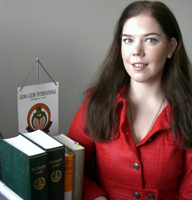The proper formulation of court judgments is one of the crucial linguistic questions as regards the application of the law and legal decision making. In her doctoral thesis, Emilia Lindroos, MA, examines criminal judgments handed down in Germany and Finland in recent years, comparing them in terms of content, structure and style. Her research reveals that where content and structure are concerned, the degree of formality in such judgments in both countries can be attributed to the combined influence of the country’s legislation and legal culture. The phraseology found in the judgments, that is, the fixed expressions, have most often been taken directly from legal texts.
In the research, which is situated in the field of legal linguistics, Ms. Lindroos analyses the degree of similarity between texts representing case-law in Germany and Finland. She demonstrates that criminal judgments in Germany are more formal in structure and content than their counterparts in Finland.
As she points out: “The guidelines in German legislation and legal literature on how to write criminal judgments are more detailed than they are in Finland. In addition, legal works containing model judgments and emphasising the ‘correct’ way to write judgments have great significance in German legal culture”.
Ms. Lindroos has investigated the degree of formality in judgments as regards the order in which information and matters are presented and the phraseology used. The material for the study comprised judgments handed down in a range of criminal cases in courts of first instance in Finland and Germany. Her research also finds application where the interest is the principle of mutual recognition of criminal judgments and the Directive of the European Parliament and Council on the right to interpretation and translation in criminal proceedings.
Formality in content and structure reflected in usage
With regard to style, both Finnish and German legal literature take a negative view on expressions that are considered general in nature or that are deemed formal, for these can be seen as devices for skirting the obligation to provide grounds for a judgment.
According to Ms. Lindroos, fixed expressions that are bound to the legal culture and legislation nevertheless constitute, as linguistic units, an essential dimension of writing criminal judgments. Among other things, they are used to describe the essential elements of individual offences and convey the factual content of the general doctrines of criminal law.
As Ms. Lindroos notes: “Although the law does not directly compel writers of judgments to use particular phrases, most of the phraseology in the German and Finnish materials that I have examined have been taken straight from legal texts”.
She points out that the phraseology taken from the law and, more generally, the close connection between the law and language usage can be seen has having a number of functions. These range from ensuring that the desired legal effects are achieved to guaranteeing legal certainty and the continuity of case-law.
Information on the defence
The public examination of Emilia Lindroos’s doctoral thesis Im Namen des Gesetzes – Eine vergleichende rechtslinguistische Untersuchung zur Formelhaftigkeit in deutschen und finnischen Strafurteilen will take place in the Faculty of Law on Friday, 5 June 2015, at noon. The Opponent will be Professor Jan Engberg of the University of Aarhus, and the Custos Professor emeritus Heikki Mattila of the University of Lapland. Welcome!
Information on the doctoral candidate

Emilia Lindroos (born 1983, Vantaa) completed her matriculation examination in the German School of Helsinki in 2002 and graduated with a master of arts degree from the University of Helsinki in 2007.
Ms. Lindroos has worked as a researcher and teacher at the University of Helsinki and the University of Lapland. She has also been a visiting researcher in European Legal Linguistics at the University of Cologne and at iCourts, the Centre of Excellence for International Courts at the University of Copenhagen. In addition, her experience includes work as an EU translator in Luxembourg and as a legal translator and interpreter, trainer in legal language and assistant in criminal investigations in the criminal investigation unit of the Finnish Border Guard.
At present Ms. Lindroos is a researcher in and teacher of Legal Linguistics in the Faculty of Law at the University of Lapland.
Additional information
Emilia Lindroos
Tel. 040 484 4398
emilia.lindroos (at) ulapland.fi
Press copies of the thesis are available from the University of Lapland Communications Unit: tiedotus(at)ulapland.fi
Information on the publication
Emilia Lindroos: Im Namen des Gesetzes – Eine vergleichende rechtslinguistische Untersuchung zur Formelhaftigkeit in deutschen und finnischen Strafurteilen. Acta Universitatis Lapponiensis 297. ISBN 978-952-484-806-0. ISSN 1796-6310.
UoL/Commonucations/RJ